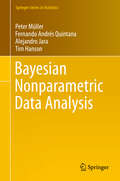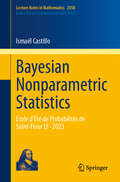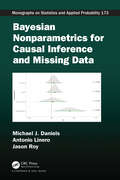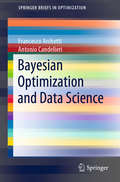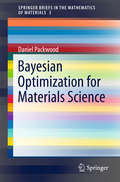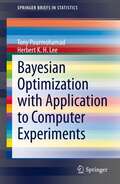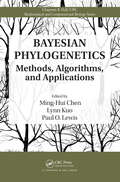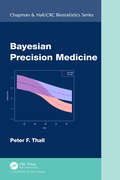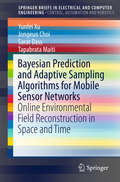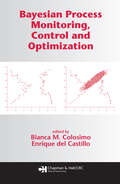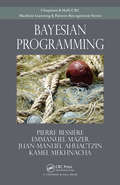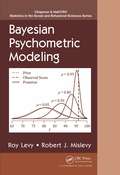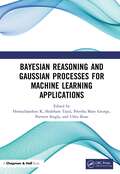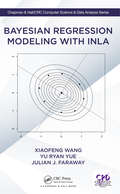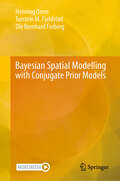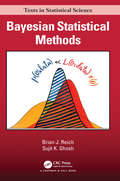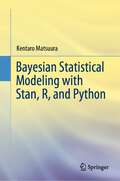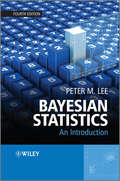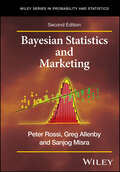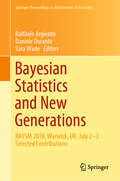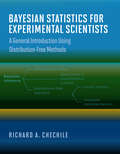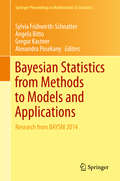- Table View
- List View
Bayesian Nonparametric Data Analysis (Springer Series in Statistics)
by Peter Müller Fernando Andres Quintana Alejandro Jara Tim HansonThis book reviews nonparametric Bayesian methods and models that have proven useful in the context of data analysis. Rather than providing an encyclopedic review of probability models, the book's structure follows a data analysis perspective. As such, the chapters are organized by traditional data analysis problems. In selecting specific nonparametric models, simpler and more traditional models are favored over specialized ones. The discussed methods are illustrated with a wealth of examples, including applications ranging from stylized examples to case studies from recent literature. The book also includes an extensive discussion of computational methods and details on their implementation. R code for many examples is included in online software pages.
Bayesian Nonparametric Statistics: École d’Été de Probabilités de Saint-Flour LI - 2023 (Lecture Notes in Mathematics #2358)
by Ismaël CastilloThis up-to-date overview of Bayesian nonparametric statistics provides both an introduction to the field and coverage of recent research topics, including deep neural networks, high-dimensional models and multiple testing, Bernstein-von Mises theorems and variational Bayes approximations, many of which have previously only been accessible through research articles. Although Bayesian posterior distributions are widely applied in astrophysics, inverse problems, genomics, machine learning and elsewhere, their theory is still only partially understood, especially in complex settings such as nonparametric or semiparametric models. Here, the available theory on the frequentist analysis of posterior distributions is outlined in terms of convergence rates, limiting shape results and uncertainty quantification. Based on lecture notes for a course given at the St-Flour summer school in 2023, the book is aimed at researchers and graduate students in statistics and probability.
Bayesian Nonparametrics for Causal Inference and Missing Data (Chapman & Hall/CRC Monographs on Statistics and Applied Probability #124)
by Michael J. Daniels Jason Roy Antonio LineroBayesian Nonparametrics for Causal Inference and Missing Data provides an overview of flexible Bayesian nonparametric (BNP) methods for modeling joint or conditional distributions and functional relationships, and their interplay with causal inference and missing data. This book emphasizes the importance of making untestable assumptions to identify estimands of interest, such as missing at random assumption for missing data and unconfoundedness for causal inference in observational studies. Unlike parametric methods, the BNP approach can account for possible violations of assumptions and minimize concerns about model misspecification. The overall strategy is to first specify BNP models for observed data and then to specify additional uncheckable assumptions to identify estimands of interest. The book is divided into three parts. Part I develops the key concepts in causal inference and missing data and reviews relevant concepts in Bayesian inference. Part II introduces the fundamental BNP tools required to address causal inference and missing data problems. Part III shows how the BNP approach can be applied in a variety of case studies. The datasets in the case studies come from electronic health records data, survey data, cohort studies, and randomized clinical trials. Features • Thorough discussion of both BNP and its interplay with causal inference and missing data • How to use BNP and g-computation for causal inference and non-ignorable missingness • How to derive and calibrate sensitivity parameters to assess sensitivity to deviations from uncheckable causal and/or missingness assumptions • Detailed case studies illustrating the application of BNP methods to causal inference and missing data • R code and/or packages to implement BNP in causal inference and missing data problems The book is primarily aimed at researchers and graduate students from statistics and biostatistics. It will also serve as a useful practical reference for mathematically sophisticated epidemiologists and medical researchers.
Bayesian Optimization and Data Science (SpringerBriefs in Optimization)
by Francesco Archetti Antonio CandelieriThis volume brings together the main results in the field of Bayesian Optimization (BO), focusing on the last ten years and showing how, on the basic framework, new methods have been specialized to solve emerging problems from machine learning, artificial intelligence, and system optimization. It also analyzes the software resources available for BO and a few selected application areas. Some areas for which new results are shown include constrained optimization, safe optimization, and applied mathematics, specifically BO's use in solving difficult nonlinear mixed integer problems. The book will help bring readers to a full understanding of the basic Bayesian Optimization framework and gain an appreciation of its potential for emerging application areas. It will be of particular interest to the data science, computer science, optimization, and engineering communities.
Bayesian Optimization for Materials Science (SpringerBriefs in the Mathematics of Materials #3)
by Daniel PackwoodThis book provides a short and concise introduction to Bayesian optimization specifically for experimental and computational materials scientists. After explaining the basic idea behind Bayesian optimization and some applications to materials science in Chapter 1, the mathematical theory of Bayesian optimization is outlined in Chapter 2. Finally, Chapter 3 discusses an application of Bayesian optimization to a complicated structure optimization problem in computational surface science. Bayesian optimization is a promising global optimization technique that originates in the field of machine learning and is starting to gain attention in materials science. For the purpose of materials design, Bayesian optimization can be used to predict new materials with novel properties without extensive screening of candidate materials. For the purpose of computational materials science, Bayesian optimization can be incorporated into first-principles calculations to perform efficient, global structure optimizations. While research in these directions has been reported in high-profile journals, until now there has been no textbook aimed specifically at materials scientists who wish to incorporate Bayesian optimization into their own research. This book will be accessible to researchers and students in materials science who have a basic background in calculus and linear algebra.
Bayesian Optimization with Application to Computer Experiments (SpringerBriefs in Statistics)
by Tony Pourmohamad Herbert K. H. LeeThis book introduces readers to Bayesian optimization, highlighting advances in the field and showcasing its successful applications to computer experiments. R code is available as online supplementary material for most included examples, so that readers can better comprehend and reproduce methods. Compact and accessible, the volume is broken down into four chapters. Chapter 1 introduces the reader to the topic of computer experiments; it includes a variety of examples across many industries. Chapter 2 focuses on the task of surrogate model building and contains a mix of several different surrogate models that are used in the computer modeling and machine learning communities. Chapter 3 introduces the core concepts of Bayesian optimization and discusses unconstrained optimization. Chapter 4 moves on to constrained optimization, and showcases some of the most novel methods found in the field. This will be a useful companion to researchers and practitioners working with computer experiments and computer modeling. Additionally, readers with a background in machine learning but minimal background in computer experiments will find this book an interesting case study of the applicability of Bayesian optimization outside the realm of machine learning.
Bayesian Phylogenetics: Methods, Algorithms, and Applications (Chapman & Hall/CRC Computational Biology Series)
by Ming-Hui Chen Lynn Kuo Paul O. LewisOffering a rich diversity of models, Bayesian phylogenetics allows evolutionary biologists, systematists, ecologists, and epidemiologists to obtain answers to very detailed phylogenetic questions. Suitable for graduate-level researchers in statistics and biology, Bayesian Phylogenetics: Methods, Algorithms, and Applications presents a snapshot of c
Bayesian Precision Medicine (Chapman & Hall/CRC Biostatistics Series)
by Peter F. ThallBayesian Precision Medicine presents modern Bayesian statistical models and methods for identifying treatments tailored to individual patients using their prognostic variables and predictive biomarkers. The process of evaluating and comparing treatments is explained and illustrated by practical examples, followed by a discussion of causal analysis and its relationship to statistical inference. A wide array of modern Bayesian clinical trial designs are presented, including applications to many oncology trials. The later chapters describe Bayesian nonparametric regression analyses of datasets arising from multistage chemotherapy for acute leukemia, allogeneic stem cell transplantation, and targeted agents for treating advanced breast cancer.Features: Describes the connection between causal analysis and statistical inference Reviews modern personalized Bayesian clinical trial designs for dose-finding, treatment screening, basket trials, enrichment, incorporating historical data, and confirmatory treatment comparison, illustrated by real-world applications Presents adaptive methods for clustering similar patient subgroups to improve efficiency Describes Bayesian nonparametric regression analyses of real-world datasets from oncology Provides pointers to software for implementation Bayesian Precision Medicine is primarily aimed at biostatisticians and medical researchers who desire to apply modern Bayesian methods to their own clinical trials and data analyses. It also might be used to teach a special topics course on precision medicine using a Bayesian approach to postgraduate biostatistics students. The main goal of the book is to show how Bayesian thinking can provide a practical scientific basis for tailoring treatments to individual patients.
Bayesian Prediction and Adaptive Sampling Algorithms for Mobile Sensor Networks: Online Environmental Field Reconstruction in Space and Time (SpringerBriefs in Electrical and Computer Engineering)
by Jongeun Choi Yunfei Xu Sarat Dass Tapabrata MaitiThis brief introduces a class of problems and models for the prediction of the scalar field of interest from noisy observations collected by mobile sensor networks. It also introduces the problem of optimal coordination of robotic sensors to maximize the prediction quality subject to communication and mobility constraints either in a centralized or distributed manner. To solve such problems, fully Bayesian approaches are adopted, allowing various sources of uncertainties to be integrated into an inferential framework effectively capturing all aspects of variability involved. The fully Bayesian approach also allows the most appropriate values for additional model parameters to be selected automatically by data, and the optimal inference and prediction for the underlying scalar field to be achieved. In particular, spatio-temporal Gaussian process regression is formulated for robotic sensors to fuse multifactorial effects of observations, measurement noise, and prior distributions for obtaining the predictive distribution of a scalar environmental field of interest. New techniques are introduced to avoid computationally prohibitive Markov chain Monte Carlo methods for resource-constrained mobile sensors. Bayesian Prediction and Adaptive Sampling Algorithms for Mobile Sensor Networks starts with a simple spatio-temporal model and increases the level of model flexibility and uncertainty step by step, simultaneously solving increasingly complicated problems and coping with increasing complexity, until it ends with fully Bayesian approaches that take into account a broad spectrum of uncertainties in observations, model parameters, and constraints in mobile sensor networks. The book is timely, being very useful for many researchers in control, robotics, computer science and statistics trying to tackle a variety of tasks such as environmental monitoring and adaptive sampling, surveillance, exploration, and plume tracking which are of increasing currency. Problems are solved creatively by seamless combination of theories and concepts from Bayesian statistics, mobile sensor networks, optimal experiment design, and distributed computation.
Bayesian Probability Theory
by Wolfgang Von Der Linden Volker Dose Udo Von ToussaintFrom the basics to the forefront of modern research, this book presents all aspects of probability theory, statistics and data analysis from a Bayesian perspective for physicists and engineers. The book presents the roots, applications and numerical implementation of probability theory, and covers advanced topics such as maximum entropy distributions, stochastic processes, parameter estimation, model selection, hypothesis testing and experimental design. In addition, it explores state-of-the art numerical techniques required to solve demanding real-world problems. The book is ideal for students and researchers in physical sciences and engineering.
Bayesian Process Monitoring, Control and Optimization
by Bianca M. Colosimo Enrique Del CastilloAlthough there are many Bayesian statistical books that focus on biostatistics and economics, there are few that address the problems faced by engineers. Bayesian Process Monitoring, Control and Optimization resolves this need, showing you how to oversee, adjust, and optimize industrial processes.Bridging the gap between application and dev
Bayesian Programming (Chapman & Hall/CRC Machine Learning & Pattern Recognition)
by Pierre Bessiere Emmanuel Mazer Juan Ahuactzin Kamel MekhnachaA new modeling methodology, new inference algorithms, new programming languages, and new hardware are all needed to create a complete Bayesian computing framework. Focusing on the methodology and algorithms, this book describes the first steps toward reaching that goal. It emphasizes probability as an alternative to Boolean logic, covering new methods to build probabilistic programs for real-world applications. The book encourages readers to explore emerging areas and develop new programming languages and hardware architectures. A Python package is available on a supplementary website.
Bayesian Psychometric Modeling (Chapman & Hall/CRC Statistics in the Social and Behavioral Sciences)
by Robert J. Mislevy Roy LevyA Single Cohesive Framework of Tools and Procedures for Psychometrics and AssessmentBayesian Psychometric Modeling presents a unified Bayesian approach across traditionally separate families of psychometric models. It shows that Bayesian techniques, as alternatives to conventional approaches, offer distinct and profound advantages in achieving many goals of psychometrics.Adopting a Bayesian approach can aid in unifying seemingly disparate—and sometimes conflicting—ideas and activities in psychometrics. This book explains both how to perform psychometrics using Bayesian methods and why many of the activities in psychometrics align with Bayesian thinking.The first part of the book introduces foundational principles and statistical models, including conceptual issues, normal distribution models, Markov chain Monte Carlo estimation, and regression. Focusing more directly on psychometrics, the second part covers popular psychometric models, including classical test theory, factor analysis, item response theory, latent class analysis, and Bayesian networks. Throughout the book, procedures are illustrated using examples primarily from educational assessments. A supplementary website provides the datasets, WinBUGS code, R code, and Netica files used in the examples.
Bayesian Reasoning and Gaussian Processes for Machine Learning Applications
by Hemachandran KThis book introduces Bayesian reasoning and Gaussian processes into machine learning applications. Bayesian methods are applied in many areas, such as game development, decision making, and drug discovery. It is very effective for machine learning algorithms in handling missing data and extracting information from small datasets. Bayesian Reasoning and Gaussian Processes for Machine Learning Applications uses a statistical background to understand continuous distributions and how learning can be viewed from a probabilistic framework. The chapters progress into such machine learning topics as belief network and Bayesian reinforcement learning, which is followed by Gaussian process introduction, classification, regression, covariance, and performance analysis of Gaussian processes with other models. FEATURES Contains recent advancements in machine learning Highlights applications of machine learning algorithms Offers both quantitative and qualitative research Includes numerous case studies This book is aimed at graduates, researchers, and professionals in the field of data science and machine learning.
Bayesian Reasoning and Machine Learning
by David BarberMachine learning methods extract value from vast data sets quickly and with modest resources. They are established tools in a wide range of industrial applications, including search engines, DNA sequencing, stock market analysis, and robot locomotion, and their use is spreading rapidly. People who know the methods have their choice of rewarding jobs. This hands-on text opens these opportunities to computer science students with modest mathematical backgrounds. It is designed for final-year undergraduates and master's students with limited background in linear algebra and calculus. Comprehensive and coherent, it develops everything from basic reasoning to advanced techniques within the framework of graphical models. Students learn more than a menu of techniques, they develop analytical and problem-solving skills that equip them for the real world. Numerous examples and exercises, both computer based and theoretical, are included in every chapter. Resources for students and instructors, including a MATLAB toolbox, are available online.
Bayesian Regression Modeling with INLA (Chapman & Hall/CRC Computer Science & Data Analysis)
by Xiaofeng Wang Julian J. Faraway Yu Yue RyanINLA stands for Integrated Nested Laplace Approximations, which is a new method for fitting a broad class of Bayesian regression models. No samples of the posterior marginal distributions need to be drawn using INLA, so it is a computationally convenient alternative to Markov chain Monte Carlo (MCMC), the standard tool for Bayesian inference. <P><P>Bayesian Regression Modeling with INLA covers a wide range of modern regression models and focuses on the INLA technique for building Bayesian models using real-world data and assessing their validity. A key theme throughout the book is that it makes sense to demonstrate the interplay of theory and practice with reproducible studies. Complete R commands are provided for each example, and a supporting website holds all of the data described in the book. An R package including the data and additional functions in the book is available to download. The book is aimed at readers who have a basic knowledge of statistical theory and Bayesian methodology. It gets readers up to date on the latest in Bayesian inference using INLA and prepares them for sophisticated, real-world work. Xiaofeng Wang is Professor of Medicine and Biostatistics at the Cleveland Clinic Lerner College of Medicine of Case Western Reserve University and a Full Staff in the Department of Quantitative Health Sciences at Cleveland Clinic. Yu Ryan Yue is Associate Professor of Statistics in the Paul H. Chook Department of Information Systems and Statistics at Baruch College, The City University of New York. Julian J. Faraway is Professor of Statistics in the Department of Mathematical Sciences at the University of Bath.
Bayesian Spatial Modelling with Conjugate Prior Models
by Henning Omre Torstein M. Fjeldstad Ole Bernhard ForbergThis book offers a comprehensive overview of statistical methodology for modelling and evaluating spatial variables useful in a variety of applications. These spatial variables fall into three categories: continuous, like terrain elevation; events, like tree locations; and mosaics, like medical images. Definitions and discussions of random field models are included for each of these three previously mentioned spatial variable types. Moreover, the readers will have access to algorithms suitable for applying this methodology in practical problem solving, and the computational efficiency of these algorithms are discussed. The presentation is made in a consistent predictive Bayesian framework, which allows separate modelling of the observation acquisition procedure, as a likelihood model, and of the spatial variable characteristics, as a prior spatial model. The likelihood and prior models uniquely define the posterior spatial model, which provides the basis for spatial simulations, spatial predictions with associated precisions, and model parameter inference. The emphasis is on Bayesian spatial modelling with conjugate pairs of likelihood and prior models that are analytically tractable and hence suitable for data abundant spatial studies. Alternative methods frequently used in spatial statistics are presented using a unified notation. The book is suitable as a textbook for a ‘Spatial Statistics’ course at the MSc or PhD level, as it also includes algorithm descriptions, project texts, and exercises.
Bayesian Speech and Language Processing
by Shinji Watanabe Jen-Tzung ChienWith this comprehensive guide you will learn how to apply Bayesian machine learning techniques systematically to solve various problems in speech and language processing. A range of statistical models is detailed, from hidden Markov models to Gaussian mixture models, n-gram models and latent topic models, along with applications including automatic speech recognition, speaker verification, and information retrieval. Approximate Bayesian inferences based on MAP, Evidence, Asymptotic, VB, and MCMC approximations are provided as well as full derivations of calculations, useful notations, formulas, and rules. The authors address the difficulties of straightforward applications and provide detailed examples and case studies to demonstrate how you can successfully use practical Bayesian inference methods to improve the performance of information systems. This is an invaluable resource for students, researchers, and industry practitioners working in machine learning, signal processing, and speech and language processing.
Bayesian Statistical Methods (Chapman & Hall/CRC Texts in Statistical Science)
by Brian J. Reich Sujit K. GhoshBayesian Statistical Methods provides data scientists with the foundational and computational tools needed to carry out a Bayesian analysis. This book focuses on Bayesian methods applied routinely in practice including multiple linear regression, mixed effects models and generalized linear models (GLM). The authors include many examples with complete R code and comparisons with analogous frequentist procedures. In addition to the basic concepts of Bayesian inferential methods, the book covers many general topics: Advice on selecting prior distributions Computational methods including Markov chain Monte Carlo (MCMC) Model-comparison and goodness-of-fit measures, including sensitivity to priors Frequentist properties of Bayesian methods Case studies covering advanced topics illustrate the flexibility of the Bayesian approach: Semiparametric regression Handling of missing data using predictive distributions Priors for high-dimensional regression models Computational techniques for large datasets Spatial data analysis The advanced topics are presented with sufficient conceptual depth that the reader will be able to carry out such analysis and argue the relative merits of Bayesian and classical methods. A repository of R code, motivating data sets, and complete data analyses are available on the book’s website. Brian J. Reich, Associate Professor of Statistics at North Carolina State University, is currently the editor-in-chief of the Journal of Agricultural, Biological, and Environmental Statistics and was awarded the LeRoy & Elva Martin Teaching Award. Sujit K. Ghosh, Professor of Statistics at North Carolina State University, has over 22 years of research and teaching experience in conducting Bayesian analyses, received the Cavell Brownie mentoring award, and served as the Deputy Director at the Statistical and Applied Mathematical Sciences Institute.
Bayesian Statistical Modeling with Stan, R, and Python
by Kentaro MatsuuraBayesian Statistical Modeling with Stan, R, and Python
Bayesian Statistics
by Peter M. LeeBayesian Statistics is the school of thought that combines prior beliefs with the likelihood of a hypothesis to arrive at posterior beliefs. The first edition of Peter Lee's book appeared in 1989, but the subject has moved ever onwards, with increasing emphasis on Monte Carlo based techniques.This new fourth edition looks at recent techniques such as variational methods, Bayesian importance sampling, approximate Bayesian computation and Reversible Jump Markov Chain Monte Carlo (RJMCMC), providing a concise account of the way in which the Bayesian approach to statistics develops as well as how it contrasts with the conventional approach. The theory is built up step by step, and important notions such as sufficiency are brought out of a discussion of the salient features of specific examples.This edition:Includes expanded coverage of Gibbs sampling, including more numerical examples and treatments of OpenBUGS, R2WinBUGS and R2OpenBUGS.Presents significant new material on recent techniques such as Bayesian importance sampling, variational Bayes, Approximate Bayesian Computation (ABC) and Reversible Jump Markov Chain Monte Carlo (RJMCMC).Provides extensive examples throughout the book to complement the theory presented.Accompanied by a supporting website featuring new material and solutions.More and more students are realizing that they need to learn Bayesian statistics to meet their academic and professional goals. This book is best suited for use as a main text in courses on Bayesian statistics for third and fourth year undergraduates and postgraduate students.
Bayesian Statistics and Marketing (Wiley Series In Prob And Statistics/see 1345/6,6214/5 Ser.)
by Peter E. Rossi Greg M. Allenby Sanjog MisraFine-tune your marketing research with this cutting-edge statistical toolkit Bayesian Statistics and Marketing illustrates the potential for applying a Bayesian approach to some of the most challenging and important problems in marketing. Analyzing household and consumer data, predicting product performance, and custom-targeting campaigns are only a few of the areas in which Bayesian approaches promise revolutionary results. This book provides a comprehensive, accessible overview of this subject essential for any statistically informed marketing researcher or practitioner. Economists and other social scientists will find a comprehensive treatment of many Bayesian methods that are central to the problems in social science more generally. This includes a practical approach to computationally challenging problems in random coefficient models, non-parametrics, and the problems of endogeneity. Readers of the second edition of Bayesian Statistics and Marketing will also find: Discussion of Bayesian methods in text analysis and Machine Learning Updates throughout reflecting the latest research and applications Discussion of modern statistical software, including an introduction to the R package bayesm, which implements all models incorporated here Extensive case studies throughout to link theory and practice Bayesian Statistics and Marketing is ideal for advanced students and researchers in marketing, business, and economics departments, as well as for any statistically savvy marketing practitioner.
Bayesian Statistics and New Generations: BAYSM 2018, Warwick, UK, July 2-3 Selected Contributions (Springer Proceedings in Mathematics & Statistics #296)
by Raffaele Argiento Daniele Durante Sara WadeThis book presents a selection of peer-reviewed contributions to the fourth Bayesian Young Statisticians Meeting, BAYSM 2018, held at the University of Warwick on 2-3 July 2018. The meeting provided a valuable opportunity for young researchers, MSc students, PhD students, and postdocs interested in Bayesian statistics to connect with the broader Bayesian community. The proceedings offer cutting-edge papers on a wide range of topics in Bayesian statistics, identify important challenges and investigate promising methodological approaches, while also assessing current methods and stimulating applications. The book is intended for a broad audience of statisticians, and demonstrates how theoretical, methodological, and computational aspects are often combined in the Bayesian framework to successfully tackle complex problems.
Bayesian Statistics for Experimental Scientists: A General Introduction Using Distribution-Free Methods
by Richard A. ChechileAn introduction to the Bayesian approach to statistical inference that demonstrates its superiority to orthodox frequentist statistical analysis.This book offers an introduction to the Bayesian approach to statistical inference, with a focus on nonparametric and distribution-free methods. It covers not only well-developed methods for doing Bayesian statistics but also novel tools that enable Bayesian statistical analyses for cases that previously did not have a full Bayesian solution. The book's premise is that there are fundamental problems with orthodox frequentist statistical analyses that distort the scientific process. Side-by-side comparisons of Bayesian and frequentist methods illustrate the mismatch between the needs of experimental scientists in making inferences from data and the properties of the standard tools of classical statistics.
Bayesian Statistics from Methods to Models and Applications: Research from BAYSM 2014 (Springer Proceedings in Mathematics & Statistics #126)
by Sylvia Frühwirth-Schnatter Angela Bitto Gregor Kastner Alexandra PosekanyThe Second Bayesian Young Statisticians Meeting (BAYSM 2014) and the research presented here facilitate connections among researchers using Bayesian Statistics by providing a forum for the development and exchange of ideas. WU Vienna University of Business and Economics hosted BAYSM 2014 from September 18th to the 19th. The guidance of renowned plenary lecturers and senior discussants is a critical part of the meeting and this volume, which follows publication of contributions from BAYSM 2013. The meeting's scientific program reflected the variety of fields in which Bayesian methods are currently employed or could be introduced in the future. Three brilliant keynote lectures by Chris Holmes (University of Oxford), Christian Robert (Université Paris-Dauphine), and Mike West (Duke University), were complemented by 24 plenary talks covering the major topics Dynamic Models, Applications, Bayesian Nonparametrics, Biostatistics, Bayesian Methods in Economics, and Models and Methods, as well as a lively poster session with 30 contributions. Selected contributions have been drawn from the conference for this book. All contributions in this volume are peer-reviewed and share original research in Bayesian computation, application, and theory.
